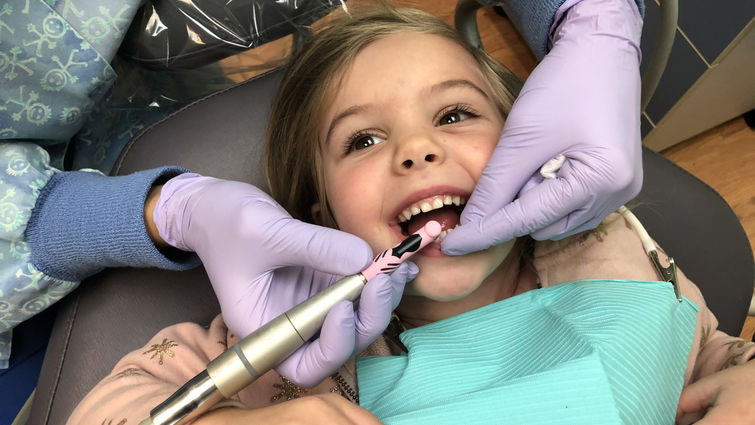

Cavities are one of the most common childhood diseases, yet some parents may not realize they are preventable. Jung-Wei “Anna” Chen, DDS, MS, MS, PhD, chair and program director of the Advanced Specialty Education Program in Pediatric Dentistry, discusses early dental care, the importance of prevention, and the surprising factors that contribute to childhood cavities.
Q: Some people think of cavities as just holes in teeth. Can you explain what they really are?
Chen: Cavities, or caries, are actually a contagious bacterial disease. The bacteria responsible for cavities can be transmitted from person to person, including from a mother to her baby or among siblings. This is why maternal dental health is so important. If a mother has cavities or poor oral hygiene, she can pass the bacteria to her child.
Q: What can mothers do to protect their child’s dental health?
Chen: Mothers should take care of their own dental health, especially during pregnancy. This includes maintaining a well-balanced diet with enough calcium, getting cavities treated, and practicing good oral hygiene. By doing so, they can reduce the risk of transmitting cavity-causing bacteria to their baby.
Q: When should a baby first visit the dentist?
Chen: Babies should see a pediatric dentist within six months of their first tooth erupting or at 12-month-old. Early visits allow us to check for early signs of cavities and provide guidance on preventive care.
Q: What are some of the biggest contributors to cavities in young children?
Chen: Frequent snacking, especially sugary foods and drinks like juice or soda, is a major factor. Social and economic factors play a role. Families with limited access to healthy foods may rely on processed, sugary options, which increase the risk of cavities.
Q: How can parents promote good oral hygiene in their children?
Chen: Parents should start wiping their baby’s gums even before teeth appear, then begin brushing as soon as the first tooth erupts. Using a finger brush or soft toothbrush is best. Children should brush twice a day for two minutes and visit the dentist every six months. Xylitol gum can also help increase saliva flow, self-cleansing muscle movement and reduce cavity-causing bacteria by making it harder for them to produce acid that leads to decay.
Q: Are there any misconceptions about sugar and cavities?
Chen: Yes. Many parents believe that organic sugars are better for teeth, but bacteria do not discriminate. Organic sugar can still cause cavities just like regular sugar. Our hospital educates families about hidden sugars in drinks like orange juice, boba tea, and sodas, and emphasizes brushing or rinsing the mouth immediately after consuming sugary items.
Q: How do genetics play a role in cavity development?
Chen: Genetics can impact enamel strength. Some genetic conditions, like amelogenesis imperfecta, result in weak enamel, making teeth more susceptible to decay. However, even without a genetic predisposition, family food choices, and eating habits and shared bacteria contribute significantly. If parents and siblings have cavities, a child is more likely to develop them as well due to shared bacteria and similar diet.
Q: What are some efforts to address childhood cavities beyond clinical care?
Chen: We take a comprehensive approach by addressing social, economic, and educational factors. We work to increase oral health literacy among families, educate them on proper nutrition, and dispel myths about dental care. Our goal is to prevent cavities before they start.
How does bedtime bottle-feeding, or prolonged breastfeeding contribute to Early Childhood Caries?
Chen: Allowing a baby to go to bed with a bottle, bottle-feeding beyond one year of age, or prolonged co-sleeping while breastfeeding are major risk factors for Early Childhood Caries (also known as baby bottle caries). The issue isn’t just the use of a bottle but the habit of leaving the last sip of milk in the mouth overnight. This, combined with sugar and active bacteria, increases the risk of tooth decay.
Q: Any final advice for parents?
Chen: Prevention is key. Start early, make regular dental visits a priority, and be mindful of diet and oral hygiene habits. A proactive approach can save children from the pain and complications of cavities, setting them up for a lifetime of healthy smiles.
